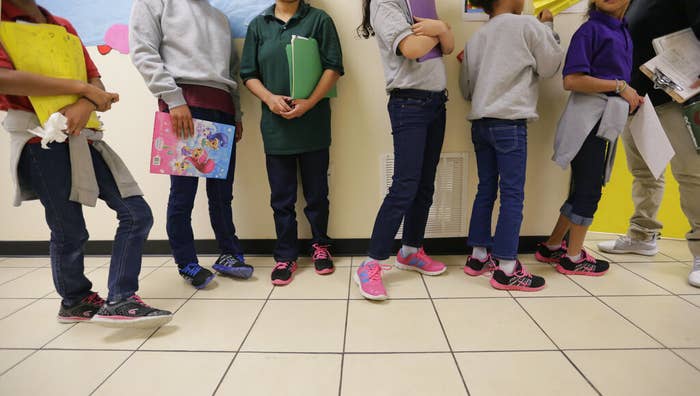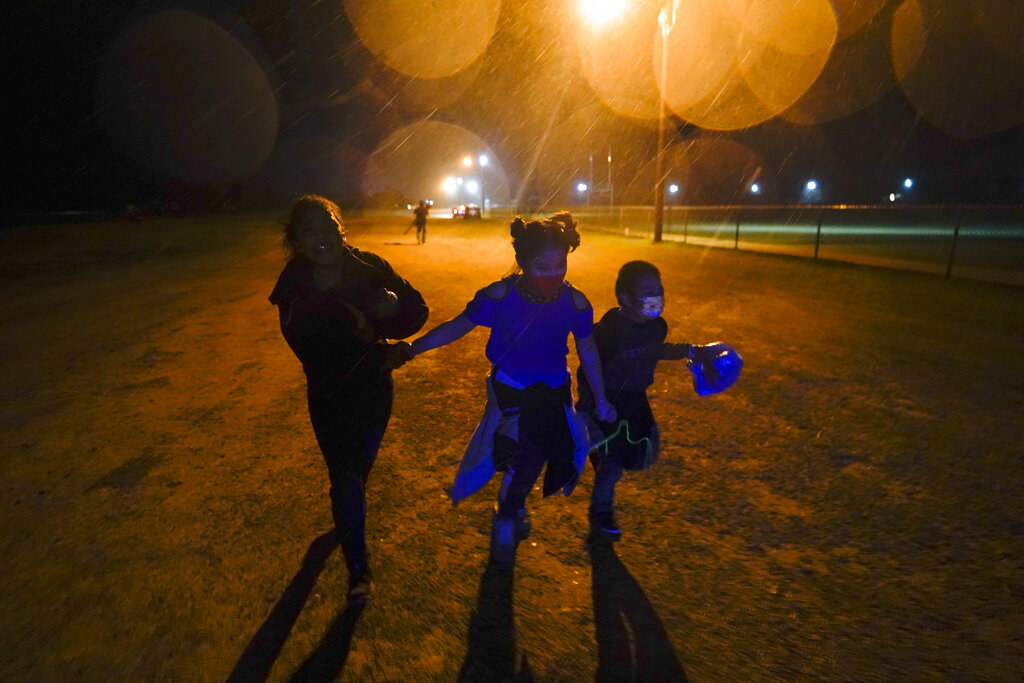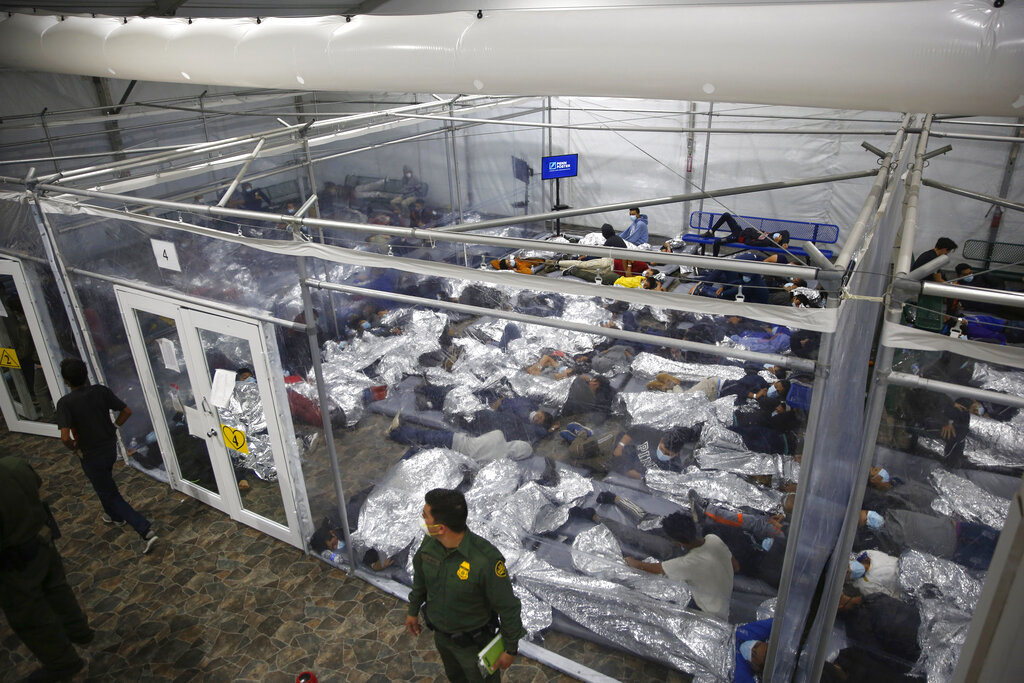
Unaccompanied immigrant children who are in US custody and want to end a pregnancy are being moved to states that don’t have newly enacted abortion restrictions while advocates push to guarantee access for detainees across the board.
New abortion bans or restrictions across the US have made it nearly impossible for immigrant minors who cross the border alone and end up in government shelters to access the procedure in some states. The majority of these children end up being detained by the government in states where abortion access is now either severely restricted or nonexistent. And because miscarriage procedures can be identical to those for abortions, some patients have faced delays or been denied medical care due to providers' fear of breaking the law despite the treatment still being legal.
"You hear these horror stories because of abortion bans," said Brigitte Amiri, deputy director of the ACLU's Reproductive Freedom Project. "It's not wise to put a pregnant minor in danger by sending them to some of these states with bans."
Since the Supreme Court's decision in June to overturn Roe v. Wade, reproductive rights advocates have been asking the Department of Health and Human Services' (HHS) Office of Refugee Resettlement (ORR), which is responsible for housing immigrant children who cross the border without a parent or guardian, to expand their policy on abortion access.
In October, after Texas's six-week abortion ban went into effect, ORR issued guidance on pregnant unaccompanied immigrant children that said staff should "to the greatest extent possible" try to place them in a facility outside the state.
The guidance also said pregnant unaccompanied children who want an abortion can request a transfer to another state where getting the procedure is an option. The transfer will be made unless ORR believes it’s not in the child’s best interest, the guidance added. But that directive only covered Texas, and access to abortion services across the country has changed significantly since then, advocates said.

Abortion is completely banned with some limited exceptions in Alabama, Arkansas, Kentucky, Louisiana, Mississippi, Missouri, Oklahoma, South Dakota, and Texas. In other states like Florida, Georgia, Idaho, North Carolina, Ohio, and Tennessee, abortion is still legal but has restrictions on how soon the procedure must be performed. Some states, including Arizona, Indiana, and Iowa, are expected to begin enforcing laws that totally ban or restrict abortion access.
Because the number of states banning or restricting abortion is fluctuating, there needs to be national guidance on what government shelters in different parts of the country have to do if an unaccompanied child wants to have an abortion, Amiri said.
"They need to expand the policy because it's now not just Texas but about a dozen states where you aren't able to get an abortion at all or past six weeks," Amiri said.
HHS did not respond to a request for comment.
"I have no doubt that if an anti-abortion president is elected in 2024 that he will remove the protections for access to abortion that currently exist for minors in ORR custody."
ORR is working on an updated policy, and advocates have heard that the agency was already transferring minors to other states if they need access to abortion services, Amiri said. But nothing official has been released.
Some miscarriage treatment is still legal, but it has still resulted in confusion and a chilling effect among providers fearing they're breaking the law, Amiri also noted. In some cases, even if a miscarriage is inevitable, but there is still embryonic or fetal cardiac activity, doctors cannot see the procedure through unless the situation fits within the ban's limited exceptions, such as to save the patient's life, Amiri said.
The Texas guidance from October was the result of a settlement agreement with the ACLU, which filed a lawsuit on behalf of a group of unaccompanied minors, including one who the Trump administration prevented from accessing abortion while in ORR custody. Under the settlement, ORR must provide unaccompanied immigrant minors in its care access to abortion. Ideally, Amiri said, ORR wouldn't even place a pregnant unaccompanied minor in a state like Texas, but that goes beyond the terms of the settlement, which only guarantees access to abortion.
The settlement in the case was based on the constitutional right to abortion, which no longer exists after the Supreme Court overturned Roe v. Wade, Amiri said. Access could still be complicated if the unaccompanied immigrant minors are in a state where abortion is legal, Amiri said, because a conservative administration could reverse the current ORR policy and place all of the children in a state like Texas.
"It's yet another layer of how tenuous abortion access is for a very vulnerable population," Amiri said. "I have no doubt that if an anti-abortion president is elected in 2024 that he will remove the protections for access to abortion that currently exist for minors in ORR custody."

Numbers on how many unaccompanied minors have requested an abortion since Roe v. Wade was overturned haven’t been released, but an ACLU court briefing from 2019 offers a snapshot. From March 30, 2018, through the end of that year, at least 31 unaccompanied immigrant children requested access to an abortion. At least 22 minors requested an abortion in the first six months of 2019.
As of Tuesday, HHS said it had 9,170 children in its custody.
Melissa Adamson, an attorney with the National Center for Youth Law, said that as of early August, more than 80% of unaccompanied minors in federal custody were held in states that restrict or ban abortion. Texas, which has some of the most restrictive laws against abortion, already holds a majority of unaccompanied immigrant minors at facilities throughout the state.
Mishan Wroe, a senior attorney with the National Center for Youth Law, said the Dobbs ruling in June could decimate access to abortion for unaccompanied children because most of them are detained in states where abortion is severely restricted or nonexistent. Echoing the concerns of other advocates, Wroe said the ruling allows a future administration to try to eliminate access to abortion for unaccompanied youth entirely, regardless of where they are detained.
For the time being, Wroe said she hopes the Biden administration will update its guidance for abortion access for those in ORR custody.
“Immigrant youth often arrive in the US having fled abuse and violence, including sexual violence,” Wroe said. "These youth must have unobstructed access to all health care services, including abortion, regardless of where they are detained.”
